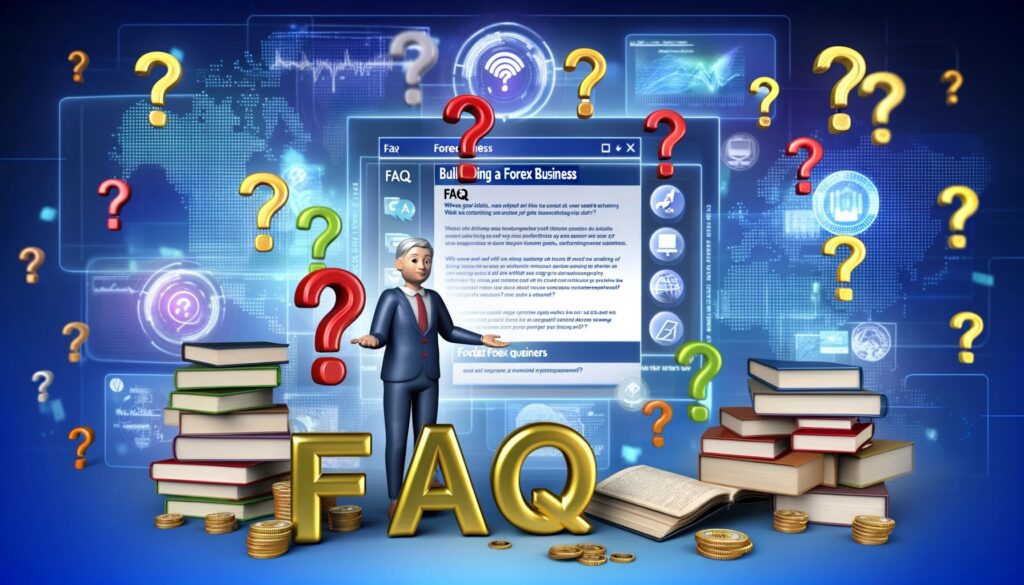Introduction: The Vision of Building a Forex Business
The journey from being a Forex trader to establishing a thriving Forex business is one marked by strategic evolution, deep market understanding, and an entrepreneurial spirit. For many traders, Forex trading begins as a personal venture into financial markets—a quest for profit through currency exchange. However, the transition from individual trading to building a Forex business encompasses a shift towards a broader vision, one that seeks not only personal financial success but also the creation and growth of a sustainable enterprise.
In the world of Forex, where market sentiments can shift as rapidly as the tides, the role of patience, strategic foresight, and disciplined risk management cannot be overstated. Yet, what distinguishes a Forex business from individual trading endeavors is the scalability and structure it offers. It transforms trading from a solitary pursuit into an entrepreneurial journey, opening doors to new revenue streams, whether through managing assets, offering educational services, or developing automated trading solutions.
The aspiration to build a Forex business stems from the desire for more than just trading profits. It embodies the pursuit of long-term wealth, independence, and the creation of a legacy within the financial markets. This ambition requires traders to wear multiple hats—not just as market analysts but as business strategists, compliance officers, and marketing directors.
Building a Forex business also means navigating a landscape filled with regulatory considerations, technological advancements, and the perpetual challenge of market volatility. Success in this venture hinges on a comprehensive understanding of the Forex market, a well-crafted business plan, and an adeptness at leveraging technology for operational efficiency and growth.
As we embark on this exploration of transforming trading acumen into entrepreneurial success, we delve into the essential components of starting and scaling a Forex business. From the foundational knowledge every Forex entrepreneur should possess, through the intricacies of regulatory compliance, to the strategic use of technology and digital marketing, each step of the journey is critical.
Through practical advice, industry insights, and examples of successful Forex businesses, this article aims to guide aspiring Forex entrepreneurs from the initial concept of their enterprise to the realization of their business goals. The path from trader to entrepreneur is fraught with challenges but illuminated by opportunities for those willing to navigate its course with patience, strategy, and an unwavering focus on long-term success.

Laying the Groundwork: Understanding the Forex Market
The Essentials of Forex Trading
To build a successful Forex business, a deep understanding of the market’s fundamentals is crucial. Forex, or foreign exchange, is the world’s largest financial market, where currencies are traded 24 hours a day, five days a week. It’s a market driven by global economic indicators, interest rates, and geopolitical events, offering both vast opportunities and significant risks.
Example: A Forex business focusing on trading strategies must grasp the impact of economic news releases, such as the Non-Farm Payroll in the US, on currency volatility. Understanding these dynamics is essential for developing trading algorithms or advisory services that can navigate such events profitably.
Regulatory Considerations for Forex Businesses
Navigating the regulatory landscape is a critical step in building a Forex business. Regulations vary significantly by country and are designed to protect traders and ensure market integrity. Compliance is not optional; it’s a foundational aspect of operating a legitimate and sustainable Forex business.
Example: In the United States, Forex brokers must register with the Commodity Futures Trading Commission (CFTC) and become members of the National Futures Association (NFA). A Forex education service must also adhere to guidelines, ensuring they do not make misleading claims about potential earnings.

Developing a Business Plan for Your Forex Enterprise
Crafting a detailed business plan is a pivotal step for traders transitioning into entrepreneurs. This plan serves as a roadmap, outlining your business model, operational structure, financial projections, and strategies for growth and risk management.
Identifying Your Business Model
The first step in your business plan is to clearly define the type of Forex business you intend to establish. The Forex market offers various avenues for entrepreneurial endeavors, each with its unique challenges and opportunities.
- Trading on Behalf of Clients: Starting a fund management service requires not only trading expertise but also strong credentials and trust-building mechanisms to attract clients.
- Offering Trading Signals or Courses: This model capitalizes on your market knowledge by providing education or actionable trading insights to subscribers.
- Developing Automated Trading Systems: For those with a technical background, creating Expert Advisors (EAs) or other trading bots can be a lucrative path, offering tools that traders can use to automate their strategies.
Example: Consider the success story of a Forex trading education platform that started by offering free, high-quality content to build an audience. Leveraging this audience, the platform introduced a subscription-based model for premium content, including advanced courses and personalized coaching, resulting in a scalable and profitable business.
Setting Up Your Business Structure
Choosing the right business structure is essential for operational efficiency, tax planning, and liability protection. The structure you choose—be it a sole proprietorship, partnership, limited liability company (LLC), or corporation—will impact everything from your daily operations to your tax obligations.
- LLC: Offers liability protection to owners while providing flexibility in management and tax benefits.
- Corporation: Suitable for larger operations with potential for raising capital through stock, but comes with more regulatory compliance requirements.
Financial Planning and Risk Management
A comprehensive financial plan, including startup capital, operating expenses, and revenue projections, is crucial. Equally important is a risk management strategy that identifies potential financial and operational risks and outlines measures to mitigate them.
- Capital Requirements: Estimate the initial capital needed to launch your Forex business, considering licensing fees, technology investments, and marketing.
- Risk Management Strategies: Develop protocols for managing trading risks, operational risks (such as cybersecurity threats), and compliance risks.

The Role of Technology in Scaling Your Forex Business
Embracing technological advancements is essential for Forex businesses aiming to achieve scalability and operational efficiency. From trading platforms to customer relationship management (CRM) systems, technology can significantly impact your business’s ability to grow and adapt in a competitive market.
Leveraging Trading Platforms and Tools
The choice of trading platforms and tools is pivotal for Forex businesses, especially those directly involved in trading activities or providing trading-related services.
- Advanced Trading Platforms: Utilize platforms that offer real-time market data, comprehensive analysis tools, and automation capabilities. This enables efficient market analysis and execution of trades based on predefined criteria.
- Example: A Forex business that develops proprietary algorithms for automated trading can leverage platforms like MetaTrader 4 (MT4) or MetaTrader 5 (MT5), which support custom Expert Advisors (EAs). This not only enhances trading efficiency but also provides a scalable service offering to clients.
Automating for Efficiency
Automation technology plays a key role in streamlining both trading and administrative tasks, freeing up resources to focus on strategic growth initiatives.
- Automated Trading Systems: For businesses offering trading strategies, automated systems can execute trades 24/7 based on technical indicators or market conditions, ensuring you never miss a trading opportunity.
- Business Process Automation (BPA): Implement BPA tools for routine administrative tasks such as client onboarding, billing, and compliance checks. This reduces operational costs and minimizes the risk of errors.

Marketing Your Forex Business
In a digital age, effective marketing is crucial for building brand awareness and attracting clients to your Forex business. A well-executed marketing strategy can differentiate your business in a crowded market.
Building a Brand in the Forex Market
Establishing a strong brand identity is fundamental. Your brand should communicate your business’s unique value proposition, expertise, and credibility.
- Content Marketing: Create and distribute valuable, relevant content that addresses your target audience’s needs and challenges. Educational blog posts, market analysis videos, and live trading webinars can position your business as a thought leader in the Forex space.
Effective Digital Marketing Techniques
Digital marketing channels offer cost-effective ways to reach and engage with your target audience.
- SEO: Optimize your website and content for search engines to improve visibility for keywords related to Forex trading. This can drive organic traffic to your site, generating leads and conversions.
- Social Media Marketing: Platforms like Twitter, Facebook, and LinkedIn can be powerful tools for connecting with potential clients, sharing insights, and promoting your services.
- Email Marketing: Develop a strategy to nurture leads and keep your audience engaged with regular updates, trading tips, and promotional offers.

Expanding Your Reach: Networking and Collaboration
For a Forex business, growth isn’t just about internal strategies and client acquisition; it’s also about forming strategic partnerships and engaging with the wider trading community.
Fostering Strategic Partnerships
Strategic partnerships can open new avenues for business development, from co-developing products to expanding your customer base.
- Broker Partnerships: Collaborating with established Forex brokers can provide access to a broader array of trading platforms and tools, enhancing your service offerings.
- Technology Providers: Partnering with FinTech companies can facilitate access to cutting-edge technologies, from AI-driven analytics to blockchain for secure transactions.
Example: A Forex educational service might partner with a trading platform provider to offer an integrated learning and trading solution, providing a seamless experience for novice traders.
Community Engagement and Education
Building a community around your Forex business not only aids in brand building but also establishes trust and credibility. Engaging with your audience through forums, social media, and webinars can foster loyalty and word-of-mouth referrals.
- Online Forums and Social Media: Actively participating in Forex trading forums and social media groups can help in understanding the needs of your target audience and adjusting your offerings accordingly.
- Conducting Webinars and Workshops: Hosting educational webinars and workshops can position your business as a thought leader, attracting individuals eager to learn about Forex trading.

Conclusion: Charting the Path to Entrepreneurial Success in Forex
Transitioning from Forex trading to building a Forex business is a journey filled with challenges, learning, and opportunities. This journey demands more than just trading expertise; it requires an entrepreneurial mindset, a strategic approach to business development, and a commitment to continuous learning and adaptation.
Your Forex business can thrive by understanding the market’s foundations, developing a solid business plan, leveraging technology, and employing effective marketing strategies. Furthermore, expanding your reach through networking and strategic partnerships can provide valuable support and accelerate growth.
Remember, building a Forex business is a marathon, not a sprint. Patience, perseverance, and a focus on delivering value will guide you toward long-term success and financial independence.

FAQ Section: Starting Your Forex Business
To round off this guide, here are answers to some frequently asked questions about starting a Forex business:
How much capital do I need to start a Forex business?
The initial capital requirement can vary widely depending on your business model and operational needs. While a trading signal service might require minimal upfront investment, a fund management firm would need significantly more to cover regulatory, technological, and marketing expenses.
What is the most important factor for success in a Forex business?
While several factors contribute to the success of a Forex business, perhaps the most critical is understanding your target market’s needs and consistently delivering value through your services or products.
How can I differentiate my Forex business in a competitive market?
Differentiation can come from offering unique value propositions, such as specialized trading strategies, exceptional customer service, or innovative technology solutions. Understanding your competition and identifying gaps in the market can also reveal opportunities for differentiation.


